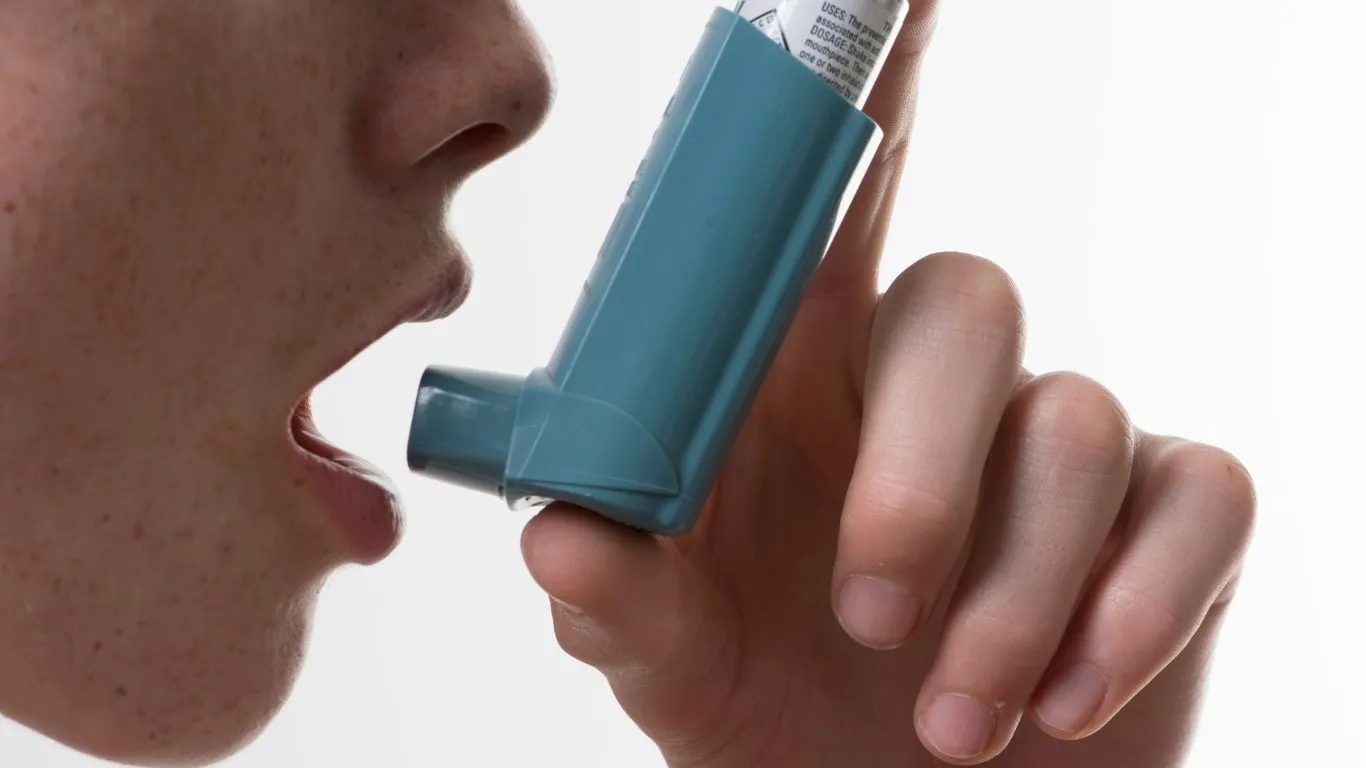Can Asthma Cause Dry Throat in the Morning? Effective Solutions for Relief
As a Pulmonary Nurse with years of experience working with patients who suffer from various respiratory conditions, one of the most frequently asked questions I get is whether asthma can cause a dry throat in the morning. It’s a common concern, and if you’ve ever woken up feeling like your throat is sore, dry, or scratchy, you may be wondering if asthma could be to blame. Well, you’re not alone. The truth is, yes, asthma can contribute to a dry throat, particularly in the mornings. But there’s more to it than just the condition itself. Let’s dive into why this happens, what factors are involved, and what you can do about it.
What is Asthma and How Does it Affect the Body?
Before we explore the connection between asthma and dry throat, let’s take a step back and briefly talk about what asthma is. Asthma is a chronic disease that affects the airways in your lungs, causing them to become inflamed and narrow, which makes it harder to breathe. Asthma can be triggered by various factors such as allergens, exercise, cold air, smoke, or even stress. For those who live with asthma, managing symptoms is an ongoing process that includes using inhalers, avoiding triggers, and sometimes taking medication to reduce inflammation.
Now, asthma affects the respiratory system, and it’s not just limited to the lungs. The entire airway, from the nose down to the throat, is impacted. So, it stands to reason that if your airways are inflamed, it can cause some unexpected side effects, like a dry or scratchy throat. But how does that happen exactly?
Can Asthma Cause Dry Throat in the Morning?
One of the main reasons asthma can lead to a dry throat, particularly in the morning, is due to something called “mouth breathing.” When your airways are constricted or inflamed, it can be harder to breathe through your nose. As a result, you may find yourself breathing through your mouth, especially while you’re asleep. Mouth breathing, although it’s a natural response to restricted airflow, can dry out your throat overnight.

In addition to that, asthma symptoms often worsen at night due to various factors. During the night, your body’s natural defense mechanisms, like the production of mucus, may become less effective. The mucus that your body produces to protect the airways can thicken, making it harder for you to clear your throat. This is why many people with asthma experience more pronounced symptoms in the morning, including a dry, scratchy throat.
The Role of Medication in Dry Throat
It’s also important to consider the role that asthma medications can play in causing a dry throat. If you’re using inhalers or certain medications to control your asthma symptoms, these treatments can sometimes lead to a dry mouth or throat as a side effect. Inhalers, especially those containing steroids, can cause dryness in the mouth and throat, as well as other side effects like a sore throat or a hoarse voice.
If you’re using a corticosteroid inhaler to control inflammation, it’s important to rinse your mouth after using the inhaler to reduce the risk of dryness. However, even with good oral hygiene, you might still experience some dryness in the mornings. So, if you’re waking up with a dry throat and you use inhalers regularly, this could be a contributing factor.

Other Factors That Could Contribute to a Dry Throat in the Morning
While asthma is certainly a contributing factor, there are other potential reasons for waking up with a dry throat. Let’s take a look at a few of them:
- Environmental Factors: The air in your bedroom could be a major factor. Dry indoor air, especially during the winter months, can exacerbate the dryness in your throat. If your home has a lot of dust or allergens, it may also trigger asthma symptoms and contribute to throat dryness.
- Dehydration: Not drinking enough water before bed can lead to dehydration, which may cause your throat to feel dry in the morning. Asthma medications can also contribute to dehydration, so it’s important to stay hydrated.
- Post-Nasal Drip: Many people with asthma also suffer from allergies, which can lead to post-nasal drip. This occurs when mucus from your sinuses drips down the back of your throat, causing irritation and dryness. Post-nasal drip is more noticeable in the morning after a night’s sleep.
- Sleep Apnea: If you have asthma and also suffer from sleep apnea, this can worsen the feeling of a dry throat. Sleep apnea causes interruptions in breathing during sleep, and these interruptions may lead to mouth breathing and increased throat dryness.
When to Seek Help
If you’re experiencing a dry throat in the morning and it’s becoming a persistent issue, it’s important to talk to your healthcare provider. While asthma can certainly be a cause, there may be other underlying conditions that need attention. A healthcare professional can help identify the root cause of your symptoms and offer recommendations to manage them more effectively.

In the next section, we’ll go deeper into the strategies you can implement to manage morning throat dryness effectively and improve your overall asthma control. Stay tuned!
Effective Ways to Manage a Dry Throat Caused by Asthma
Now that we understand how asthma can lead to a dry throat in the morning, let’s talk about how to manage it. As someone who’s worked with asthma patients for years, I know firsthand how uncomfortable a dry, scratchy throat can feel, especially when you’re just waking up. But don’t worry – there are several strategies and tips that can help alleviate this issue and make your mornings a bit more pleasant.

Stay Hydrated Before Bed
One of the simplest yet most effective ways to reduce a dry throat in the morning is by staying hydrated. Dry air and dehydration can exacerbate throat dryness, so it’s important to drink plenty of water throughout the day. But don’t forget to hydrate before going to bed, too. A glass of water right before sleep can help keep your throat moist throughout the night, especially if you’re prone to mouth breathing due to asthma.
If you’re someone who has trouble remembering to drink water, consider setting a reminder on your phone or keeping a water bottle next to your bed. I always advise my patients to keep sipping on water during the evening – it’s a small change that can make a big difference by morning!
Use a Humidifier at Night
As we discussed earlier, dry indoor air can make asthma symptoms worse and contribute to a dry throat. Using a humidifier in your bedroom while you sleep can help keep the air moist and prevent your throat from drying out overnight. Humidifiers work by releasing water vapor into the air, which helps maintain the natural moisture levels in your respiratory system.
Humidifiers are especially beneficial during the winter months when indoor heating systems can make the air in your home even drier. I’ve seen many patients find significant relief from morning throat dryness simply by adding a humidifier to their routine. Just be sure to clean it regularly to prevent mold or bacteria buildup – this could cause even more issues!

Adjust Your Asthma Medication Routine
As mentioned earlier, certain asthma medications, especially inhalers, can contribute to throat dryness. If you’re noticing that your throat feels particularly dry in the mornings, it might be time to reassess your medication routine. There are several steps you can take to minimize this side effect:
- Use a Spacer: If you’re using a metered-dose inhaler (MDI), consider using a spacer device. This tool helps to ensure that the medication is delivered directly into your lungs rather than remaining in your mouth and throat, which can lead to dryness.
- Switch Inhalers: If your current inhaler is causing excessive dryness, talk to your doctor about trying a different one. There are many types of inhalers and asthma medications available, and your doctor can help you find one that causes fewer side effects like dryness.
- Rinse After Use: If you’re using a corticosteroid inhaler, always rinse your mouth after each use. This simple habit can help wash away any medication left behind in your mouth or throat, reducing the chances of dryness and irritation.
In my experience, making small adjustments like switching to a spacer or rinsing the mouth after inhaler use can greatly improve patient comfort. It’s a quick fix that can prevent more severe issues later on.
Consider Allergy Treatments
If your asthma is triggered by allergies, it could also be contributing to your dry throat in the mornings. Post-nasal drip, which is when mucus from your sinuses drips down the back of your throat, is a common issue for those with asthma and allergies. This constant drainage can lead to irritation, making your throat feel dry and scratchy.
Allergy treatments like antihistamines or nasal sprays can help control this drip and reduce the overall dryness in your throat. If you’re not sure whether allergies are contributing to your symptoms, I recommend discussing it with your healthcare provider. They can help you identify specific triggers and offer treatment options to manage both your asthma and allergies simultaneously.
Proper Sleep Habits to Reduce Morning Throat Dryness
Believe it or not, your sleep position can also affect your morning throat dryness. If you sleep with your mouth open due to asthma or nasal congestion, you may be increasing the chances of waking up with a dry throat. Mouth breathing is a common response when nasal passages are blocked, and it can lead to excessive dryness.
Here are some tips to minimize mouth breathing while you sleep:
- Sleep on Your Side: Sleeping on your back can sometimes make it harder to breathe, especially if you’re prone to asthma or allergies. Try sleeping on your side or with your head slightly elevated to keep your airways open.
- Use Nasal Strips: Nasal strips can help open up your nostrils, making it easier to breathe through your nose. I’ve recommended these to many patients who have trouble with nasal congestion at night, and they’ve found them very helpful.
- Consider a CPAP Machine: If your asthma is paired with sleep apnea, a CPAP machine can help you breathe more easily during the night, reducing the chances of mouth breathing and throat dryness. If you think sleep apnea might be an issue for you, it’s worth discussing with your doctor.

In my practice, I often tell my patients that adjusting your sleep routine, even in small ways, can make a big difference in how you feel when you wake up. It’s all about finding what works best for you and making your sleep environment as asthma-friendly as possible.
Managing asthma-related dry throat may seem like a challenging task at first, but with a few lifestyle changes and adjustments to your asthma treatment plan, you can significantly improve the situation. Remember, it’s important to work closely with your healthcare provider to tailor your approach and find the best solutions for your specific needs.
When to See a Doctor About Your Dry Throat
If you’ve tried all the tips and tricks for managing a dry throat caused by asthma and still find yourself struggling, it might be time to consult a healthcare professional. As someone who has seen many patients go through this process, I can tell you that sometimes dry throat can signal a more complex issue that needs attention. It’s not just about asthma – there could be other contributing factors at play.
Here are a few signs that it’s time to make an appointment with your doctor:
- Persistent Throat Dryness: If your throat remains dry even after trying various remedies like staying hydrated or using a humidifier, it could indicate an underlying issue that needs a professional diagnosis.
- Difficulty Breathing: If your asthma symptoms are worsening or you’re noticing shortness of breath along with a dry throat, this could be a sign that your asthma isn’t properly controlled. Your doctor may need to adjust your medication or treatment plan.
- Chronic Coughing or Sore Throat: A sore throat or chronic cough that doesn’t go away despite using asthma medications could be indicative of another condition such as acid reflux or an infection. It’s important to get checked out to rule out any other problems.
Always listen to your body. If something feels off, don’t hesitate to reach out to your healthcare provider. In my experience, early intervention can make a world of difference in your asthma management and overall quality of life.

Other Possible Causes of Morning Throat Dryness
While asthma is a primary cause of morning throat dryness, it’s not the only culprit. In my years of treating patients, I’ve seen a variety of reasons for this common issue. It’s essential to consider all possibilities before jumping to conclusions. Let’s explore a few other conditions and factors that might be contributing to your dry throat:
Gastroesophageal Reflux Disease (GERD)
One potential cause of morning throat dryness is GERD, or acid reflux. In people with GERD, stomach acid flows back into the esophagus, often while you’re lying down at night. This can lead to irritation in the throat and a dry, scratchy feeling when you wake up. Interestingly, GERD symptoms can sometimes overlap with asthma symptoms, especially if the acid reflux triggers asthma-like responses. If you’ve been battling throat dryness along with heartburn or a sour taste in your mouth, it may be worth checking in with your doctor about the possibility of GERD.
Sleep Apnea
Another common condition that might cause a dry throat in the morning is sleep apnea. This is a disorder in which your breathing repeatedly stops and starts during sleep. People with sleep apnea often wake up with a dry mouth and throat, as they tend to breathe through their mouths during sleep. If you have asthma and find yourself waking up frequently throughout the night or feeling excessively tired during the day, sleep apnea could be another factor to consider. Sleep studies are typically used to diagnose this condition, so talk to your doctor if you suspect sleep apnea might be affecting your quality of sleep.

Tips for Ongoing Asthma Management
Managing asthma is an ongoing process, and it’s important to stay proactive to avoid dry throat and other symptoms. As a nurse, I always emphasize the importance of regular checkups and medication adjustments to help keep your asthma under control. Here are a few additional tips for staying on top of your asthma and reducing the risk of morning throat dryness:
- Track Your Symptoms: Keeping a journal of your asthma symptoms can be a helpful tool for both you and your doctor. Note things like when your throat feels dry, what triggers your asthma symptoms, and how often you’re waking up during the night. This information can help your doctor fine-tune your treatment plan.
- Follow Your Asthma Action Plan: Most people with asthma are given an asthma action plan, which outlines the steps you should take to manage your condition. Make sure you’re following it closely, taking your prescribed medications as directed, and using your inhaler when needed.
- Limit Exposure to Triggers: Avoiding asthma triggers is key to managing your condition and preventing throat dryness. Whether it’s allergens, cold air, or smoke, try to minimize your exposure to these irritants to keep your airways as healthy as possible.
It’s all about staying consistent and vigilant when it comes to managing your asthma. While it’s natural to experience fluctuations in your symptoms, maintaining a routine that supports your respiratory health will go a long way in minimizing discomfort like dry throat in the mornings.
References
For more information on asthma, its management, and related conditions, I encourage you to check out trusted sources such as the Health.com website, the Asthma and Allergy Foundation of America, or your own healthcare provider.
Disclaimer
The content provided in this article is for informational purposes only and should not be considered as medical advice. Always consult with a healthcare provider for accurate diagnosis and appropriate treatment options based on your specific health needs.

Bianca Nala is a compassionate Nurse Practitioner with a strong background in primary and respiratory care. As a health writer for Healthusias.com, she combines her clinical expertise with a talent for clear, relatable storytelling to help readers better understand their health. Bianca focuses on topics like asthma, COPD, chronic cough, and overall lung health, aiming to simplify complex medical topics without losing accuracy. Whether she’s treating patients or writing articles, Bianca is driven by a single goal: making quality healthcare knowledge accessible to everyone.







